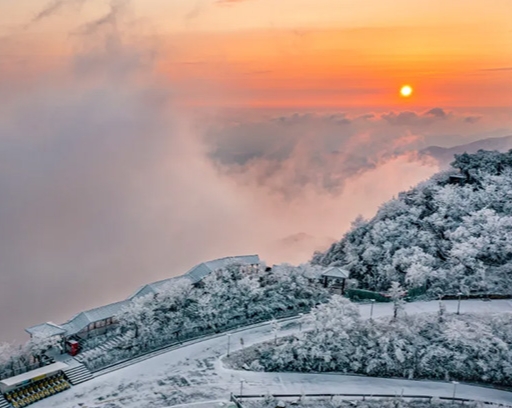Li Qing · President of Society of Forest Medicine within the Japanese Society for Hygiene | Forest Bathing is Attractive
EDITOR'S NOTE: On May 29 2021, the main activity of the third International Mountain Tourism Day—the World Heritage Famous Mountain (Jinfo Mountain) Summit kicked off in Nanchuan District, Chongqing Municipality, China successfully. Themed with “World Heritage Protection and Green Development of Mountain Tourism”, the Summit got strong support from the World Tourism Organization (UNWTO), the World Intellectual Property Organization (WIPO), the International Union for Conservation of Nature (IUCN), the World Travel & Tourism Council (WTTC), the Pacific Asia Travel Association (PATA), the Global Tourism Economy Forum (GTEF), the Internationale Organisation Für Volkskunst (IOV) and the China Association of National Parks and Scenic Sites. As an important sub-event of this summit, the International Seminar on Mountain and Hot Spring Wellness Tourism was held with top experts and scholars at home and abroad. They gave keynote speeches and shared frontier observations focusing on mountain tourism, hot spring tourism, and health tourism to explore "the integrated development of hot spring wellness, climate wellness, forest wellness and mountain tourism". The speeches will be released in succession to share with industry colleagues.
Li Qing, President of Society of Forest Medicine within the Japanese Society for Hygiene delivered an online speech at International Seminar on Mountain and Hot Spring Wellness Tourism:
Hello, everyone. I am Li Qing, the President of Society of Forest Medicine within the Japanese Society for Hygiene. Today, I would like to talk about the benefits of forest bathing
What is forest bathing? Forest bathing means enjoying the therapeutic benefits of forest by walking in the forest to prevent diseases and promote health. Five senses (sight, hearing, smell, taste and touch) are involved. The concept of forest bathing (forest therapy) was coined by the Japanese Ministry of Agriculture, Forestry and Fisheries in 1982. In 2004, the Japanese government invested 150 million yen in studying the benefits of forest bathing. I was a major member of the study.
Scientific researches on forest bathing
In 2005, I made the world’s first experiment about forest bathing in Nagano Prefecture. The findings were published in 2007, which for the first time named and defined the terms of Forest Bathing/Shinrin-Yoko. The researched group rested in the forest for three days and two nights. Results showed that the activity of NK cell (abbreviation of natural killer cell, which is a kind of immune cells) significantly increased, and the four types of anti-cancer protein, include Granulysin, Perforin, Granzyme A, and Giranzyme B also increased. In addition, we also conducted a controlled test on “general tourism”, whose results showed no influence to NK activity.
In 2006, the second experiment was made at the birthplace of forest bathing in Nagano Prefecture. It proved that the forest bathing produces continued effect for as long as one month. In 2007, the third experiment was made, which proved that forest bathing is effective both for males and for females.
The effect of forest bathing on stress hormones
Through research, we found that compared to general tourism, forest bathing has better effect in gradually reducing the adrenal hormone concentration in human’s urine (related to mental stress), norepinephrine (related to physical stress) and cortisol concentration (related to both mental and physical stress) to achieve the result of decompression. When the human body is under stress, it will feel nervous and uneasy. At the same time, it secretes "stress hormones" to inhibit NK activity and affect the immune response. Forest bathing can reduce the secretion of "stress hormones" and restore NK activity to relieve these stresses.
The preventive effect of forest bath on depression and its application in rehabilitation medicine
Forest bathing also plays certain preventive effect in improving different bad moods. Forest bathing can increase the concentration of serotonin in the serum, which is related to depression.
I once worked in a rehabilitation hospital and conducted research on the application of forest bathing in the field of rehabilitation medicine. This hospital has a very large garden with dense forests. Patients often take forest baths accompanied by physiotherapists. The results found that forest bathing can reduce the nervousness, restlessness, depression, depression, anger, hostility, fatigue, confusion and other unhealthy emotions of patients, so as to achieve the effect of preventing depression, and can improve and increase the effect of physical therapy.
The effect of forest bathing on blood pressure and psychology
We conducted three experiments in 2010, 2014 and 2015 (a check experiment between “forest bathing” and “walking in cities”). The subjects of the experiment were hypertensive patients. They were asked to stop taking medicine during the experiment. In the two check experiments, the blood pressure of the patients showed little difference at first, but had a huge difference in the afternoon, which is about 7-8 millimeters measured by mercury column. Therefore, compared with city walk, forest bathing has a significant effect of lowering blood pressure with no negative effects.
The mechanism of forest bathing to lower blood pressure
First of all, forest bathing can lower down the blood pressure by reducing sympathetic nerve activities and activating parasympathetic nerves. At the same time, as we mentioned before, forest bathing can reduce stress, and stress is closely related to blood pressure. So generally speaking, forest bathing can prevent hypertension through the three mechanisms.
The influence of forest bath on neural intelligence
Forest bathing can significantly lower down the heart rate, which exactly represents your intelligent nervous system. As shown in the figure below, after the same group of people take a forest bath in different periods, their heart rate values decrease in different levels. Lower heart rate means eased burden on your heart. So, forest bathing can also prevent heart diseases.
The effect of forest bathing in urban parks
We used to conduct forest bathing experiments in city parks, and found that it also has the effects of improving vitality, relieving stress and preventing depression. Take our experiment in Shinjuku Gyoen National Garden as an example. The garden is filled with beautiful flowers, bushes and lawns, which can help you relieve the adverse emotions. So when you walk in the city, instead of taking a walk in the bustling business street, going for a walk in the park is a better choice.
Now, to summarize the medical effects of forest bathing (forest therapy):
1.Forest bathing can increase immune system and prevent cancer.
2.Forest bathing can lower blood pressure and heart rate to prevent hypertension and heart diseases.
3.Forest bathing can reduce stress hormone level.
4.Forest bathing can decrease sympathetic nerve activity and increase parasympathetic nerve activity.
5.Forest bathing can significantly increase energy; ease up anxiety, depression,hostility, angry, confusion, and fatigue; to prevent melancholia.
6.Forest bathing can improve sleep quality.
7.Forest bathing can also promote health of people in sub-healthy (not sick) status.
8.Forest bathing can prevent lifestyle diseases by reducing stress.
9.Forest bathing is also applied in rehabilitation medicine.







